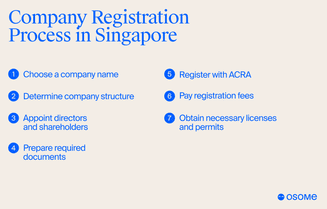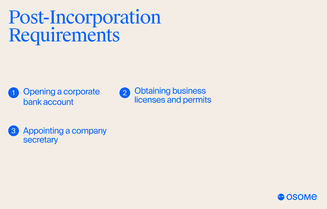Best Guide to Company Registration in Singapore From Malaysia
- Modified: 16 April 2025
- 15 min read
- Starting a Company


Heather Cameron
Author
From expert guidance and helpful accounting tips to insights on the latest trends in fintech, Heather is here to empower entrepreneurs and small business owners in Singapore with great content. With a background in digital marketing spanning eight years, she has experience writing for various industries and audiences. As Osome’s copywriter, she’s here to inform and inspire our readers with great storytelling.

Deepti Laddha
Reviewer
Deepti Laddha, our Head of Corporate Operations in Singapore, brings a decade of experience to her role, supporting our business writers in crafting insightful and engaging articles. With a strong background in corporate services, Deepti is a rich source of knowledge and expertise. We can count on her to assist in transforming any definition, concept or complicated jargon into helpful tips that help our readers take their businesses to the next level.
Looking to register your company in Singapore? This guide simplifies the process, answering why you should consider Singapore for your business and outlining the steps you need to take for a smooth registration.
Key Takeaways
- The process of registering a company in Singapore is fast and efficient. Attractive tax benefits and a supportive government environment also appeal to foreign companies, particularly ones from Malaysia.
- Understanding the various business structures available, compliance requirements, including the necessity of appointing a local director, and preparing incorporation documents, such as your company constitution, are crucial for doing business in Singapore.
- Engaging service providers helping with Singapore company registration can streamline the registration process and ensure ongoing compliance with regulatory obligations, helping businesses focus on growth and innovation.
Why Register a Company in Singapore?
Singapore is not just a hub for you to register a company in Asia: it is a gateway to a world of opportunities. Ranked #2 in the World Bank’s Doing Business, registering a company in Singapore is seamless and efficient. The ease with which a foreigner can own 100% of a company in Singapore, combined with the government’s streamlined company registration process, makes it an appealing destination for business owners from Malaysia.
The types of business structures available for registration in Singapore are diverse, catering to different business needs. From Private Limited Companies to Limited Liability Partnerships and Sole Proprietorships, entrepreneurs form their Singapore companies under the most suitable business structure. Furthermore, the Singapore government substantially supports new businesses, making the environment even more conducive to entrepreneurial success.
Tax benefits
One of the most compelling reasons to register a company in Singapore is its attractive tax regime. With a corporate tax rate of just 17%, Singapore offers significant tax incentives, especially for small and medium enterprises (SMEs). For the first three years, SMEs can benefit from exemptions on earnings up to S$200,000, which provides a substantial financial boost during the critical early stages of business.
Additionally, Singapore does not impose taxes on capital gains or dividend income, making it ideal for international entrepreneurs hoping to maximise their profits. The Inland Revenue Authority of Singapore also offers various programs subsidising labour costs, making the environment friendlier for those registering a new business in Singapore.
Strategic location
Singapore’s strategic location in Southeast Asia creates an unparalleled gateway to major economies with vast market potential. Known as ‘Asia Lite’ due to its favourable business environment and cultural familiarity, Singapore is an ideal base for expatriates and global businesses alike. The city-state’s efficient, award-winning Changi International Airport, with over 400 direct flights, underscores its status as a key logistics hub.
Singapore companies also enjoy an excellent regional reputation, facilitating trust and opening doors to numerous business opportunities. This strategic advantage and a robust infrastructure make Singapore a prime location for international companies looking to find new business in the Asian market.
Government support
The Singapore government provides robust entrepreneurship support to Singapore companies with various grants, tax incentives, and assistance schemes to foster business growth. For instance, the Productivity Solutions Grant (PSG) helps Singaporean companies cut costs by digitising their operations, potentially saving up to 70% on yearly accounting fees. Such initiatives can significantly reduce the financial burden on a newly registered company, allowing it to focus on growth and innovation.
Government policies also encourage entrepreneurship and innovation across various sectors. This comprehensive support system ensures a Singapore company can survive and thrive in the competitive market. These resources help businesses navigate market complexities with greater ease and confidence.
Understanding the Singapore Company Registration Process
To successfully register a company in Singapore, understanding the intricacies of the process is crucial.
All companies must register under the Companies Act and comply with its regulations.
The initial steps include:
- Securing approval from the Accounting and Corporate Regulatory Authority (ACRA) for the company’s name and registered address.
- Preparing necessary documentation.
- Submitting an application using Singapore's online portal.
Planning ahead and carefully navigating each step can help avoid delays when registering for a Singapore company.

Key requirements
Fulfilling the key requirements is crucial for successfully registering a company in Singapore. Every Singapore company must have a minimum of one shareholder but no more than 50 shareholders. Shareholders can be individuals, companies, or a mix of both, providing flexibility in company ownership.
Additionally, the company must have at least one director who is a Singapore citizen, permanent resident or holds an employment pass. The local resident director must be over 18 years old, ensuring responsible management. The initial paid-up capital required for company formation is as low as S$1, making it accessible for small business owners forming a new company without prior experience.
Choosing a business structure
Your business structure can significantly impact the company’s operations, liability, and tax obligations. In Singapore, entrepreneurs can choose from a Private Limited Company (Pte Ltd), a Limited Liability Partnership (LLP), and a Sole Proprietorship. A private limited company and a limited liability partnership company function as a separate legal entity and provide additional protection against each shareholder's personal finances. A sole proprietorship comes with unlimited liability, posing higher risks against a business owner's assets.
Private Limited Company (Pte Ltd)
The Private Limited Company (Pte Ltd) is Singapore's most popular business structure, providing additional protection for its shareholders, as the company operates as a separate legal entity, protecting their personal assets in case of business debts and liabilities.
This structure also enhances credibility with banks and investors, making raising capital and growing the business easier. Most Pte Ltds need to have a separate bank account for business purposes.
Limited Liability Partnership (LLP)
A Limited Liability Partnership (LLP) combines the flexibility of a partnership with the benefits of limited liability. This structure allows partners to manage the business directly while protecting their personal assets from business debts by establishing a separate legal identity in the business world.
Profits are taxed at personal income tax rates for individual partners and corporate tax rates for corporate partners, offering significant flexibility in tax planning. Again, LLPs must have a separate bank account for business operations.
Sole Proprietorship
A Sole Proprietorship is the simplest and most straightforward business structure, suitable for individuals who wish to own and operate a business on their own. However, it comes with unlimited liability, meaning the owner’s assets are at risk in case of business debts.
Therefore, sole proprietorship is ideal for small businesses with minimal risk. Your business name is usually either the business owner's name itself, or a memorable fictitious business name that meets the requirements.
Preparing incorporation documents
Proper preparation of incorporation documents is crucial for a seamless registration. Key documents include proof of address for your registered office address, name and contact information for your registered filing agent, consent forms for directors and shareholders and identification details of all key individuals, and the company constitution, which is the foundation of your corporation.
Organising these documents meticulously helps avoid errors and delays during registration. Engaging a corporate secretarial firm like Osome can ensure all necessary documentation is in order, streamlining the process. Osome’s expert team handles everything from drafting your company's constitution, compliance to filings, facilitating a hassle-free registration.
Registering Your Company with ACRA
The Accounting and Corporate Regulatory Authority (ACRA) governs the registration of companies in Singapore, ensuring compliance with the Companies Act. The required documents for incorporation include the directors' particulars, company secretary, and the company constitution. Entrepreneurs can submit applications for both the new business and incorporation in one step or as two separate steps via their company business profile.

Using ACRA’s services ensures that the registration process is conducted in accordance with Singapore company law, minimising the risk of errors and ensuring a smooth transition from application to incorporation.
This section will explore the use of the BizFile+ online submission platform, the process of getting company name approval, and the typical processing time for registration.
BizFile+ online submission
BizFile+ is Singapore’s online portal for company registration, offering an efficient and user-friendly process. Entrepreneurs can log in with their Singpass account to submit applications electronically via their company business profile. Access to BizFile+ is restricted to individuals with a Singpass, ensuring secure transactions with government agencies. This digital approach allows for quick and convenient submission of necessary documents.
Company name approval
Before applying for company registration, the proposed company name must receive approval from ACRA. The name must be unique and not identical to existing companies or too similar to registered trademarks.
Potential business owners can use an online tool provided by ACRA to verify the availability of their desired company name. The approval process is typically swift, often taking less than an hour.
Processing time
The typical timeframe for registering a Singapore company is remarkably swift, often completed within a few hours with the assistance of consultants. Online submissions through BizFile+ can take around 15 minutes, though the entire process might take 1 to 3 days to complete processing.
The application may need approval from another government agency. In that case, it could take a maximum of 60 days.
Post-Incorporation Steps
Several post-incorporation steps are crucial for ongoing compliance and smooth operations for your new Singapore business. Companies must file annual returns and meet legal obligations such as GST registration if their revenue exceeds S$1 million. Understanding the submission deadlines for annual returns and regular updates to statutory documents are vital for maintaining good standing with regulatory authorities.
Creating a detailed business profile, fulfilling annual filing requirements, and managing tasks like accounting and bookkeeping are essential post-incorporation activities. Consultants typically help manage these services, ensuring that newly registered companies remain compliant and focused on growth.

This section will cover the steps of opening a corporate bank account, obtaining necessary business licenses and permits, and appointing a company secretary.
Opening a corporate bank account
Opening a corporate bank account is an essential step after registering a company in Singapore. This account is crucial for facilitating business activities, managing finances, and ensuring smooth transactions for your new business entity.
Companies planning to trade overseas or accept foreign currency will need a business account that caters to specific needs.
Obtaining business licenses and permits
Certain business activities in Singapore require specific licenses and permits issued by government agencies. Obtaining the right licenses is crucial for legal compliance and smooth operation. The application process typically involves submitting the required documents to the relevant authority and waiting for approval.
Ensuring that you have all necessary permissions in place can prevent legal issues and facilitate uninterrupted business activities.
Appointing a company secretary
Appointing a company secretary is a legal requirement within six months of incorporation. The company secretary holds a fiduciary duty to keep directors and shareholders informed about annual filings and annual general meetings (AGMs).
Corporate secretarial firms offer essential services to ensure compliance with regulatory requirements, making them indispensable for newly incorporated companies. Engaging a qualified company secretary or firm can significantly ease the burden of statutory maintenance and document preparation.
Special Considerations for Foreign Entrepreneurs From Malaysia
Generally, entrepreneurs from Malaysia will find the Singapore company incorporation process hassle-free. Foreigners can own 100% of the shares and complete the incorporation process online. However, a critical requirement is appointing a local director, who must be a Singapore citizen, permanent resident, or an Employment Pass holder. Understanding these specific business regulations is essential for compliance and smooth operation.
Foreign companies can choose from various business structures depending on their goals, including Private Limited Companies, Limited Liability Partnerships, and Sole Proprietorships. The need for a local director can be met through nominee director services if the foreign entrepreneurs do not have one.
This section will delve into the specifics of Employment Pass and EntrePass, nominee director services, and setting up a representative office or branch office.

Employment Pass and EntrePass
The Employment Pass (EP) allows foreign professionals to work in Singapore upon meeting certain criteria and conditions. While EP holders can own shares in the companies they register, they cannot serve as the local director unless they are citizens or permanent residents. Obtaining an EP requires the company to be incorporated as a private limited company in Singapore.
The EntrePass is specifically designed for any foreign company starting a business that is venture-backed or driven by innovative technology. A foreign company applying for the EntrePass must be less than six months old and meet the Ministry of Manpower’s (MOM) innovative criteria. This pass focuses on establishing innovative businesses, offering a unique path for foreign entities to become Singapore companies.
Nominee director services
Nominee director services are available to help a company in Singapore comply with regulatory requirements since every new company must have at least one local director. These services allow foreign business owners to appoint Singapore citizens to serve as local directors. Contracts can be signed to limit the nominee director’s involvement, ensuring that the foreign owner retains control over the company.
Setting up a representative office or branch office
A representative office in Singapore cannot engage in profit-making activities but serves as a low-risk entry strategy for long-term investment. However, the representative office can conduct market research and facilitate meetings with minimal compliance requirements. If the parent company is dissolved, the representative office will be de-registered and will no longer be recognised.
A branch office acts as an extension of a foreign parent company and is legally accountable for its activities. Foreign businesses frequently choose to establish a branch office in order to do business in Singapore. This option is often seen as beneficial for their operations. The parent company is liable for the branch’s actions and debts, and at least one ordinarily resident Singaporean must be hired.
Finally, you can set up a subsidiary company. Unlike the branch office, a subsidiary company is majority-owned by the parent company company but operates independently. It can offer completely different services compared to the parent company.
Common Challenges and How To Overcome Them
Registering a Singapore company can be challenging, particularly for Malaysian entrepreneurs. Understanding the diverse regulations involved is crucial to avoid delays and compliance issues. Engaging professional guidance can significantly aid in overcoming these hurdles so you can successfully register a company in Singapore.
Challenges often arise from managing documentation and staying compliant with evolving legal obligations. Efficient record-keeping systems are essential for the timely submission of necessary documents and compliance with reporting deadlines.
Registering for the Central Provident Fund (CPF) and the Skills Development Levy (SDL) once you start hiring employees is also necessary. This section will explore strategies for navigating regulatory requirements, managing documentation, and ensuring compliance.
Navigating regulatory requirements
Familiarising oneself with the regulatory landscape can significantly aid in the successful registration of a company in Singapore. The legal framework is highly transparent and efficient, but entrepreneurs must stay informed about regulatory updates to avoid compliance issues.
Engaging with business service providers can help businesses stay updated and adhere to changing regulations.
Managing documentation
Efficient record-keeping systems are essential for the timely submission of necessary documents and compliance with reporting deadlines in Singapore. Proper organisation of incorporation documents, including proof of address and company particulars, is crucial for a smooth registration process.
Utilising corporate secretarial services can ensure that all documentation is accurately prepared and submitted.
Ensuring compliance
Ensuring compliance with local laws is critical for maintaining good standing with regulatory authorities. Companies in Singapore are required to submit annual returns 30 days after conducting an AGM. Timely submission of these returns is essential to avoid penalties and maintain good standing with ACRA.
Notifying ACRA within 14 days if a resident director resigns highlights the importance of maintaining proper governance. A reliable corporate service provider helps ensure compliance and minimises the risk of legal issues.
Working with Corporate Service Providers
Corporate services firms offer peace of mind and confidence for those doing business in Singapore. Business registration consultants guide you through each step of the registration process, including accounting and finance paperwork. These professionals provide essential guidance and support, ensuring that your company adheres to regulatory requirements and operates smoothly.

Professional service providers can also provide accurate estimates for registration service fees. This section will cover the services offered by corporate secretarial firms and provide tips on choosing the right provider for your business needs.
Services offered
Corporate secretarial firms offer various services to help businesses register a company and manage their corporate governance and compliance requirements. They assist with incorporation and ensure all legal formalities are completed. In addition to company incorporation, these firms manage ongoing compliance obligations, such as filing taxes and preparing documents for annual meetings, so you can safely conduct business in Singapore.
Foreign companies commonly utilise these services to navigate the complexities of local regulations and business practices, especially if they're registering a branch office or subsidiary company in Singapore. By leveraging the expertise of corporate secretarial firms, businesses can focus on growth and innovation while ensuring compliance with regulatory requirements.
Choosing the right provider
Selecting the right corporate service provider is critical for a successful company registration in Singapore. Factors such as specialisation, reputation, communication, and accountability should be considered.
Choosing a provider with a solid reputation and expertise in company incorporation and compliance ensures that your business receives quality service and support.
Summary
Registering a company in Singapore offers numerous benefits, from favourable tax policies and strategic location to robust government support. Preparing the necessary documents, appointing a local director, opening a corporate bank account with major financial institutions, and fulfilling other requirements are towards completing your company's registration successfully.
A corporate service provider can significantly ease the process, ensuring compliance with local laws and regulations. By leveraging third-party expertise, a foreign business entity can confidently establish itself as a Singapore business and open the local market. With the right guidance and support, the journey of Singapore company registration can be a seamless and rewarding experience.
FAQ
Can a foreigner own 100% of a company in Singapore?
Yes, a foreigner can own 100% of a registered company in Singapore. This flexibility tends to attract international investors to do business in Singapore. If you're hoping to enter international trading with a parent company based in Malaysia, opening up a branch office would allow you to do business in Singapore without being physically present.
What is the minimum paid-up capital required for company registration in Singapore?
The minimum paid-up capital required for registering a Singapore company is S$1. This amount allows for affordable entry into the business landscape.
What are the benefits of a Private Limited Company (Pte Ltd) in Singapore?
A Private Limited Company (Pte Ltd) in Singapore provides limited liability protection to its owners, enhancing their credibility with banks, and offers operational flexibility. This structure is particularly advantageous for businesses seeking to attract investment and manage risks effectively.
How long does it take to register a company in Singapore?
Registering a company in Singapore typically takes a few hours to 1-3 days, depending on the business entity type and document availability. It is advisable to prepare all necessary documentation in advance to expedite the process.
Is it necessary to appoint a company secretary in Singapore?
Yes, appointing a company secretary is legally required within six months of a company's incorporation in Singapore. This ensures compliance with corporate governance standards.
Get expert tips and business insights
By clicking, you agree to our Terms & Conditions,Privacy and Data Protection Policy
We’re using cookies! What does it mean?






